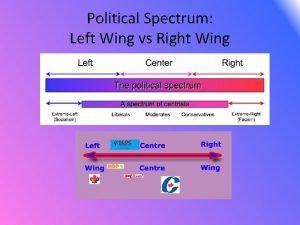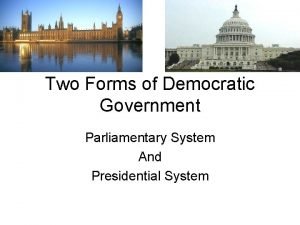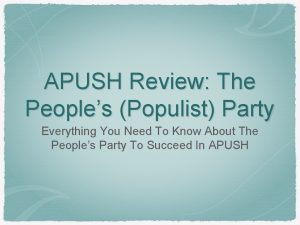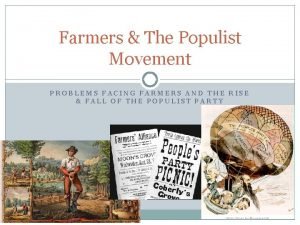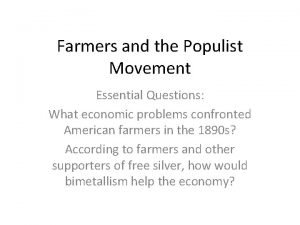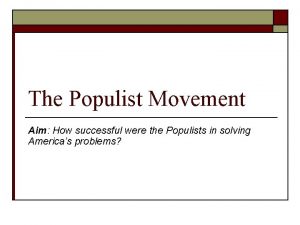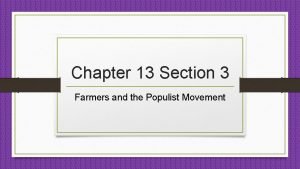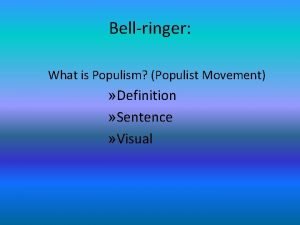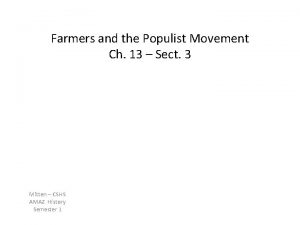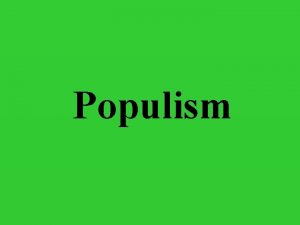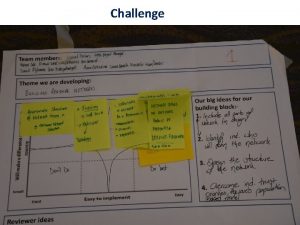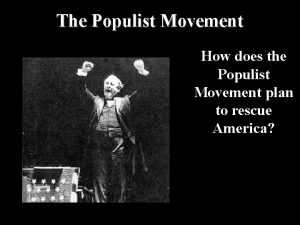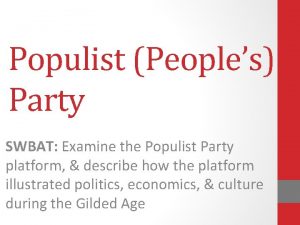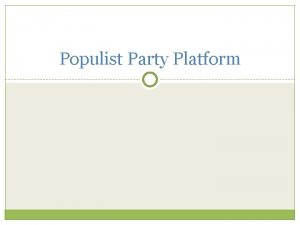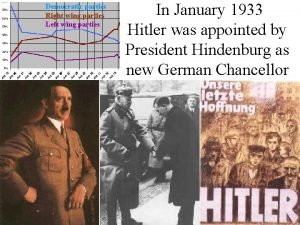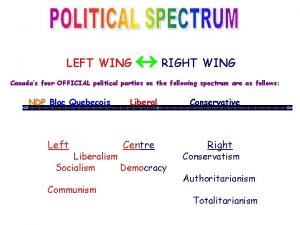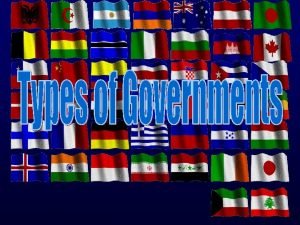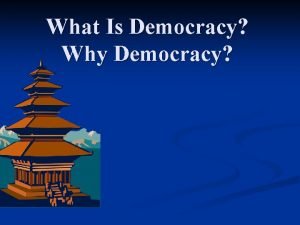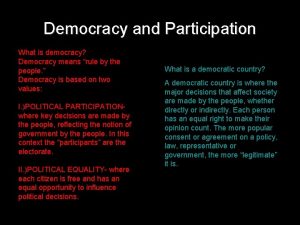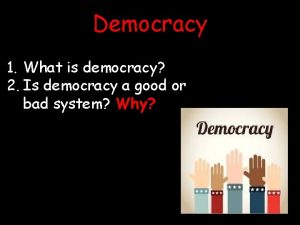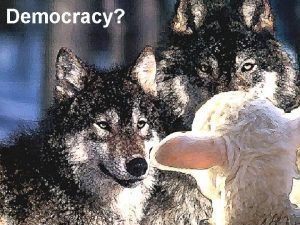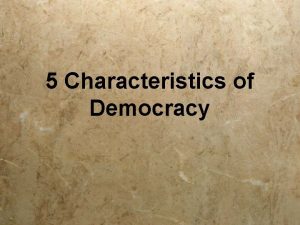The Right Wing Populist Challenge to Democracy in








































- Slides: 40

The Right Wing Populist Challenge to Democracy in Europe Wolfgang Merkel Trento May 30 – June 2, 2019 Humboldt-Universität zu Berlin

Humboldt-Universität zu Berlin Structure Electoral Development Populism as a strategy for hegemony There is difference between RWP and LWP The New Cultural Cleavage: Cosmopolitans and communitarians Threat to Democracy? Vulnerability: Populism in Germany & Italy Antipopulism 2

Humboldt-Universität zu Berlin Right-wing populist parties’ vote share (1950 -2016) Annual averages, EU member states and Iceland, Norway, and Switzerland. Source: WZB Database “Elections, Parties, Governments”.

Humboldt-Universität zu Berlin Electoral evolution of RWP and Social Democracy in WE from 1990 -2017 4

Humboldt-Universität zu Berlin Right-populist voting by education (2010 -2016) Source: Cumulated CSES Study 4.

Humboldt-Universität zu Berlin The typical RWP voter in Europe Male, rural/ small towns and lower/ medium income, medium lower education Anti-RWP voter: female, high income, well educated, from metropolitan aereas Rational strategic choice of RWP programmatique: switch from neoliberal economic policies towards social protectionism 6

Humboldt-Universität zu Berlin Thesis 1: Populism as Strategy Different definitions Thin centred ideology, „we“ against „them“, antipluralist, antiliberal, simplyfying ……. & dichotomising „manichean politics“ Pop. as a (discoursive) strategy for hegemony Creating a frontier between „us“ & „them“ Constructing the „people“ Ending postpolitics Neo-Gramscianism 7

Humboldt-Universität zu Berlin Differences between RWP & LWP Differences The way they understand people Essentialisation vs construction Ethnos vs Demos Nativism vs Underdogism Exclusive vs inclusive Similarities Dichotomisation Contempt for compromises & consensus, Against technocratic postpolitics Against elites 8

Humboldt-Universität zu Berlin Explanation Political Sequence Cosmopolitism & Communitarism as new cleavage 9

Humboldt-Universität zu Berlin Two Cleavages: The New Competition 10

Humboldt-Universität zu Berlin Cosmopolitans Winners of globalization Cultural. , political, economic elites Urban middle classes For open borders: goods, services, capital, workers, refugees Transferring souvereignty Deepening EU (Human) rights are universal; global citizens Multiculturalism Calhoun: „Frequent Flyers“ 11

Humboldt-Universität zu Berlin Communitarianists Losers of globalization Lower educated people Pro-nation state Critical against EU Controlling borders „Leitkultur“ Homogenuous communities Variety: Folkshemmet vs Right Wing Populism 12

Humboldt-Universität zu Berlin The Political Explanation 13

Humboldt-Universität zu Berlin „Embedded Democracy“ – internal and external challenges Socio-economic Heterogeneity C Civil Rights B Inequality Political Rights (de jure; in use) ILLIBERALISATION POLARIZATION A Electoral Reg SELECTIVITY MAJOIRITARIANISM Effective Power to Govern Horizontal Accountability Dominance of Executive D RENATIONALISATION E Globalisation Europeanisation

Humboldt-Universität zu Berlin RWP in Italy and Germany Italy Germany Weak state Unstable governments RWP in government High volatility Low economic prosperity Historical legacy: low Strong state More stable governments RWP in opposition Medium volatility Medium economic prosperity Histor. legacy: strong/change 15

Humboldt-Universität zu Berlin RWP a Threat I? Politically: Populism in opposition & in gov`t Junior or dominant partner in government Stable & unstable democracies Normatively: problematic programs (texts & subtexts) Ethnic/ nationalist framing Socioeconomically: Rebellion of losers? Culturally: Cosmos & Comus 16

Humboldt-Universität zu Berlin RWP a Threat II? Functionally Polarizing/ mobiliz. society: only negative? (Mouffe/ Laclau) Populist moment: changing elitist discourse Filling a representational gap? Bringing the lower class back in? Repolitization & Return of the Political: right form? Responsiveness without responsibility? 17

Humboldt-Universität zu Berlin RWP-Virus from Eastern Europe? Illiberal virus from EE? Strong governing RWP in Visegrad countries EP and council as opportunity structure for transnational RWP alliances Does RWP force a stop of European Integration? Fortress Europe as barrier against RWP? Stop of widening & deepening as barrier? Italy as a RWP key country in WE 18

Humboldt-Universität zu Berlin Antipopulist Strategies 19

Humboldt-Universität zu Berlin Conclusion: How to deal with RWP? To ignore? To fight it with normative arguments? To exclude? To embrace, coopt, and coalize? To debate without cosmopolitan hubris, to stand to democratic values, to fill the representation gap, not to overstress cosmopolitan identity politics and call everyone outside the cosmopolitan discourse as racist, sexist, and chauvinist. But: not to coalize! 20

Humboldt-Universität zu Berlin APPENDIX 21

Humboldt-Universität zu Berlin Action Banning Strategy Isolating • Formal or informal conventio ad • It limits pluralism excludendum • Grand coalitions erode strngth of • Cordon Sanitaire coalition partners • Grand Coalition against populism • RWP benefits from opposition role • „Do-nothing“ approach To ignore a successfull pop. Party may mean to ignore the populist voters Ignorance vis-a-vis the representative claims of the pop. voters Ignoring • Observation by domestic secret service • Banning RWP • „Changing the rules of party competition“ Risks Damaging democratic pluralism Illiberal reaction May create martyr myth

Humboldt-Universität zu Berlin Action Changing pop. topics Coopting themes Adapting Coalizing Strategy Risks • Decrease saliency of pop. themes Difficult for discourses largely • Focus on socioeconomic themes driven by (social) media • Transforming pop. themes in democratic programs • Adapting pop. positions • „If you can‘t beat them join them“ • Forming informal and formal coalitions • May alienate centrist voters • May pemanently shift programs to the right Parties may lose credibility May split parties Voters may vote for the „original“ May lend credibility to pop. May change the party system Established parties may lose credibility Shifts of policies to the right

Humboldt-Universität zu Berlin RWP Waves and their Themes – 1970 ies against the welfare and tax state: that has changed – 1980 ies against EU: this has even increased – 1990: against liberalism and multiculturalism – still strong – After 2000: against Islam, migration, refugees, open borders; shift from neo-liberalism to national-protectionism. 24

Humboldt-Universität zu Berlin Share of male right populist voters (2010 -2016) Source: Cumulated CSES Study 4.

Humboldt-Universität zu Berlin Right-populist voting by education (2010 -2016) Source: Cumulated CSES Study 4.

Humboldt-Universität zu Berlin Right-populist voting by Neighbourhood (2010 -2016) Source: Cumulated CSES Study 4.

Humboldt-Universität zu Berlin communitarian ECONOMY right S HT G RI / E ECONOMY UR LT CU left cosmopolitan 28

Humboldt-Universität zu Berlin Right-populist voting by Income (2010 -2016) Source: Cumulated CSES Study 4.

Humboldt-Universität zu Berlin Right Populist Party positions in the Political Spectrum (economic and cultural) in Western Europe Source: Chapel Hill Expert Survey 1999 -2014

Humboldt-Universität zu Berlin Right-wing populist parties in government (1990 -2014) Note: Only governments which lasted more than 183 days were considered. Following Immergut (2009) we included the Swedish Bildt government (1991 -1994) as it was depending on the support of New Democracy (cf. Röth, Afonso, and Spies 2017). Source: WZB Database “Elections, Parties, Governments”.

Humboldt-Universität zu Berlin Right-populist voting by education (2010 -2016) Source: Cumulated CSES Study 4.

Humboldt-Universität zu Berlin Populism in Europe and Latin America Western Europe Consolidated Dem Parliamentary Systems Up to now: in 12 govts Minor coalition partner RWP dominates LWP: democratic Semiloyal parties RWP: anti-liberal & nat. WE: Less vulnerable EE: vulnerable Latin America Less consolidated dem Presidential Systems Pop. Presidents with/without majorities LWP dominates LWP: anti/semidemocratic Anti-system or semiloyal RWP: neoliberal More vulnerable 33

Humboldt-Universität zu Berlin Ratio of male over female right-wing voters (1996 -2010) Source: Cumulated CSES Study Series 1 -3.

Humboldt-Universität zu Berlin Ratio of right-wing voters’ education/population (1996 -2010) Source: Cumulated CSES Study Series 1 -3.

Humboldt-Universität zu Berlin Ratio of right-wing voters’ household income and public (1997 -2010) Source: Cumulated CSES Study Series 1 -3.

Humboldt-Universität zu Berlin Share of male right populist voters (2010 -2016) Source: Cumulated CSES Study 4.

Humboldt-Universität zu Berlin Right-populist voting by Income (2010 -2016) Source: Cumulated CSES Study 4.

Humboldt-Universität zu Berlin Country Party Name Abbreviation Austria Electio n 2013 Freedom Party of Austria Team Stronach for Austria FPÖ Team Stronach Austria Bulgaria 2013 2014 BZÖ Ataka NDS Bulgaria Czech Republic Finland France Germany Great Britain Greece Ireland Latvia 2014 2013 2015 2012 2015 2011 Latvia Norway Poland Romania Slovakia Slovenia Sweden Switzerland Switzerland 2011 2014 2013 2011 2012 2014 2016 2011 2014 2011 2011 Alliance for the Future of Austria Attack National Movement for Stability and Progress (former Simon II) Citizens for European Development of Bulgaria Dawn of Direct Democracy of Tomio Okamura The Finns Party National Front Alternative for Germany United Kingdom Independence Party The Independent Greeks The Popular Orthodox Rally Sinn Fein National Alliance "All For Latvia!" "For Fatherland Freedom/LNNK" Union "For Fatherland Freedom"/LNNK All for Latvia National Alliance Progress Party Law and Justice Party League of Polish Families Self-Defence of the Republic of Poland Greater Romania Party People's Party - Dan Diaconescu Ordinary people - Independent personalities Slovak National Party Slovenian National Party Sweden Democrats Swiss People's Party Freedom Party Swiss Democrats Geneva Citizens' Movement Ticino League GERB Usvit PS FN Af. D UKIP ANEL LAOS SF NA TB/LNNK VL NA FRP Pi. S LPR SRP PRM PP-DD OLa. NO SNS SD SVP FPS SD MCG Lega 39

Humboldt-Universität zu Berlin Right-populist voting by Neighbourhood (2010 -2016) Source: Cumulated CSES Study 4.
 Left wing and right wing spectrum
Left wing and right wing spectrum Right product right place right time right price
Right product right place right time right price Right time right place right quantity right quality
Right time right place right quantity right quality Bat wing
Bat wing The right man on the right place at the right time
The right man on the right place at the right time Presidential form of government
Presidential form of government Whitchester house
Whitchester house Populism in america apush
Populism in america apush Populist political cartoon
Populist political cartoon The plight of the farmers political cartoon
The plight of the farmers political cartoon The wizard of oz and the populist party answers
The wizard of oz and the populist party answers Populist party
Populist party The modern colossus of railroads political cartoon meaning
The modern colossus of railroads political cartoon meaning Analyzing the populist party through political cartoons
Analyzing the populist party through political cartoons Farmers and the populist movement chapter 5 section 3
Farmers and the populist movement chapter 5 section 3 Populist party
Populist party Farmers and the populist movement section 3
Farmers and the populist movement section 3 Populist movement definition us history
Populist movement definition us history Oliver hudson kelley definition
Oliver hudson kelley definition Wizard of oz and the populist party
Wizard of oz and the populist party Munn vs. illinois
Munn vs. illinois Left left right right go go go
Left left right right go go go Go left left right right
Go left left right right Put your right foot in put your right foot out
Put your right foot in put your right foot out Mật thư anh em như thể tay chân
Mật thư anh em như thể tay chân Bổ thể
Bổ thể ưu thế lai là gì
ưu thế lai là gì Tư thế ngồi viết
Tư thế ngồi viết Thẻ vin
Thẻ vin Thể thơ truyền thống
Thể thơ truyền thống Các châu lục và đại dương trên thế giới
Các châu lục và đại dương trên thế giới Từ ngữ thể hiện lòng nhân hậu
Từ ngữ thể hiện lòng nhân hậu Diễn thế sinh thái là
Diễn thế sinh thái là Thế nào là giọng cùng tên? *
Thế nào là giọng cùng tên? * Vẽ hình chiếu vuông góc của vật thể sau
Vẽ hình chiếu vuông góc của vật thể sau Làm thế nào để 102-1=99
Làm thế nào để 102-1=99 Bài hát chúa yêu trần thế alleluia
Bài hát chúa yêu trần thế alleluia Tỉ lệ cơ thể trẻ em
Tỉ lệ cơ thể trẻ em Khi nào hổ mẹ dạy hổ con săn mồi
Khi nào hổ mẹ dạy hổ con săn mồi Lời thề hippocrates
Lời thề hippocrates đại từ thay thế
đại từ thay thế
